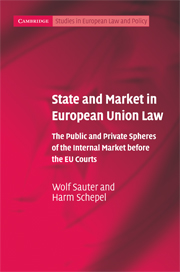 State and Market in European Union Law
State and Market in European Union Law Published online by Cambridge University Press: 22 January 2010
Introduction
This chapter will discuss how the Court decides whether the competition rules are applicable. That is: under which circumstances the competition rules apply in spite of involvement of public authorities and/or claims that restrictions of competition are in the public interest and in which cases public interest considerations prevail.
First the concepts of ‘undertaking’, ‘economic activity’, ‘public authority’ and ‘activities with an exclusively social function’ are explored. This charts the main standards applied to decide whether activities are in principle subject to the competition rules.
Next, a number of cases are discussed in which undertakings are involved, and which are therefore subject to the competition rules, and where restrictive agreements were found to be present, and no specific public interest exception existed but where the Court nevertheless concluded that Article 81 EC did not apply. The objective is to identify according to which criteria the court decides such cases, and to establish whether those criteria have general validity beyond the particular case at hand.
The concept of ‘undertaking’ under the competition rules
In principle, the competition rules of Articles 81 and 82 EC apply exclusively to undertakings. The place of these Articles in the structure of the Treaty already indicates this: Articles 81 and 82 EC are found under Title VI (common rules on competition, taxation and approximation of laws), Chapter 1 (rules on competition) section 1, headed: ‘rules applying to undertakings’. Moreover, they are explicitly drafted to address undertakings.
To save this book to your Kindle, first ensure [email protected] is added to your Approved Personal Document E-mail List under your Personal Document Settings on the Manage Your Content and Devices page of your Amazon account. Then enter the ‘name’ part of your Kindle email address below. Find out more about saving to your Kindle.
Note you can select to save to either the @free.kindle.com or @kindle.com variations. ‘@free.kindle.com’ emails are free but can only be saved to your device when it is connected to wi-fi. ‘@kindle.com’ emails can be delivered even when you are not connected to wi-fi, but note that service fees apply.
Find out more about the Kindle Personal Document Service.
To save content items to your account, please confirm that you agree to abide by our usage policies. If this is the first time you use this feature, you will be asked to authorise Cambridge Core to connect with your account. Find out more about saving content to Dropbox.
To save content items to your account, please confirm that you agree to abide by our usage policies. If this is the first time you use this feature, you will be asked to authorise Cambridge Core to connect with your account. Find out more about saving content to Google Drive.